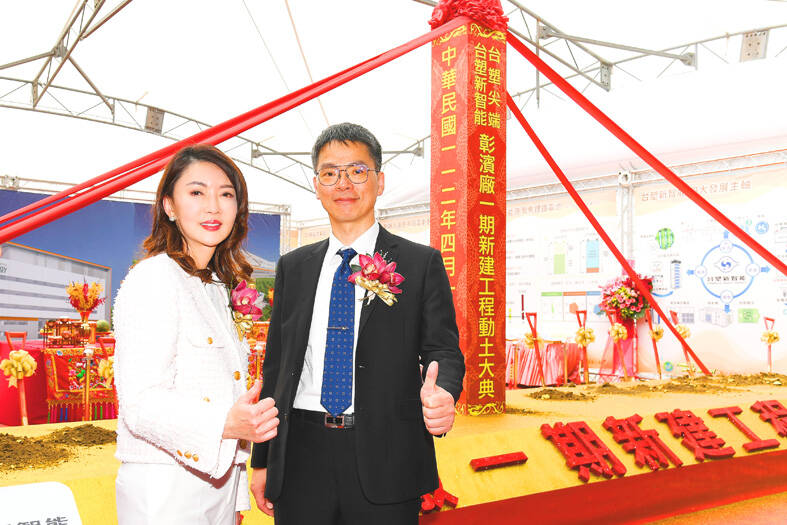Formosa Smart Energy Tech Corp (台塑新智能科技) has broken ground for a lithium iron phosphate battery cell plant in Changhua County and aims to start production at the site in the second half of next year.
Speaking at the groundbreaking ceremony on Wednesday last week, Formosa Smart Energy chairwoman Sandy Wang (王瑞瑜) said the first phase of the plant would have a production capacity of 2.1 gigawatt-hours (GWh) in battery cells and modules.
Formosa Smart Energy, part of the Formosa Plastics Group (FPG, 台塑集團), is investing NT$16 billion (US$525.19 million) to build the factory at the Changhua Coastal Industrial Park (彰濱工業區).

Photo: Chang Hui-wen, Taipei Times
Once it completes the second phase of the project, Formosa Smart Energy said the total production capacity of the combined site would reach 5GWh.
Wang said that FPG established Formosa Smart Energy in July last year to target the areas of energy conservation, energy storage, new energy development, and energy recycling and reuse.
The battery cell plant is expected to serve as a bridge connecting upstream, middle-stream and downstream segments of the local battery industry, she said.
As for energy storage, Formosa Smart Energy has inaugurated a facility in Tainan’s Yongkang District (永康) and plans to complete the construction of another plant in Changhua County by the end of this year, Wang said.
In addition, the company is also planning to build storage facilities in Yunlin, Nantou and Chiayi counties, she said.

Semiconductor business between Taiwan and the US is a “win-win” model for both sides given the high level of complementarity, the government said yesterday responding to tariff threats from US President Donald Trump. Home to the world’s largest contract chipmaker, Taiwan Semiconductor Manufacturing Co (TSMC, 台積電), Taiwan is a key link in the global technology supply chain for companies such as Apple Inc and Nvidia Corp. Trump said on Monday he plans to impose tariffs on imported chips, pharmaceuticals and steel in an effort to get the producers to make them in the US. “Taiwan and the US semiconductor and other technology industries

SMALL AND EFFICIENT: The Chinese AI app’s initial success has spurred worries in the US that its tech giants’ massive AI spending needs re-evaluation, a market strategist said Chinese artificial intelligence (AI) start-up DeepSeek’s (深度求索) eponymous AI assistant rocketed to the top of Apple Inc’s iPhone download charts, stirring doubts in Silicon Valley about the strength of the US’ technological dominance. The app’s underlying AI model is widely seen as competitive with OpenAI and Meta Platforms Inc’s latest. Its claim that it cost much less to train and develop triggered share moves across Asia’s supply chain. Chinese tech firms linked to DeepSeek, such as Iflytek Co (科大訊飛), surged yesterday, while chipmaking tool makers like Advantest Corp slumped on the potential threat to demand for Nvidia Corp’s AI accelerators. US stock

The US Federal Reserve is expected to announce a pause in rate cuts on Wednesday, as policymakers look to continue tackling inflation under close and vocal scrutiny from US President Donald Trump. The Fed cut its key lending rate by a full percentage point in the final four months of last year and indicated it would move more cautiously going forward amid an uptick in inflation away from its long-term target of 2 percent. “I think they will do nothing, and I think they should do nothing,” Federal Reserve Bank of St Louis former president Jim Bullard said. “I think the

SUBSIDIES: The nominee for commerce secretary indicated the Trump administration wants to put its stamp on the plan, but not unravel it entirely US President Donald Trump’s pick to lead the agency in charge of a US$52 billion semiconductor subsidy program declined to give it unqualified support, raising questions about the disbursement of funds to companies like Intel Corp and Taiwan Semiconductor Manufacturing Co (台積電). “I can’t say that I can honor something I haven’t read,” Howard Lutnick, Trump’s nominee for commerce secretary, said of the binding CHIPS and Science Act awards in a confirmation hearing on Wednesday. “To the extent monies have been disbursed, I would commit to rigorously enforcing documents that have been signed by those companies to make sure we get